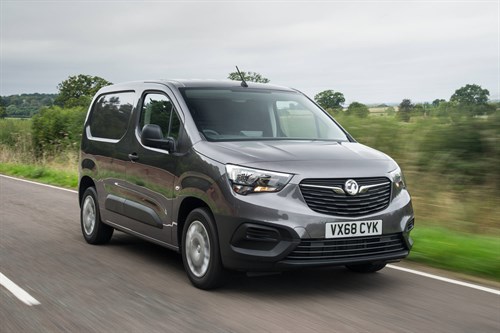- ETRUX launches new Ford E-Transit Trizone
- Renault gives UK debut to Master E-Tech at CV Show
- Isuzu D-Max long-term test – Latest Report
- Isuzu D-Max V-Cross Steel Edition revealed
- IVOTY Report: Stellantis explores the hydrogen proposition
- New Maxus EVs include eDeliver 5 van
- Used LCV values reach six-month high
- ADVERTISEMENT FEATURE: IVECO Daily Mission Awards 2024 Q2 Round-up: Grounds Maintenance & Forestry
- Stellantis Pro One electric vans review
- Mitie adds 5,000th EV to fleet
WHAT VAN? AWARDS - WINNER'S PROFILE: The Right Combination
Date: Monday, February 18, 2019 | Author: James Dallas

The award-winning Combo
With the cost of real estate a crucial consideration it was important not to have too many dealerships, and for the same reason cars are also retailed from the same locations.
Wilson candidly admits that with Vauxhall now belonging to the same group as Citroen and Peugeot, it would not make economic sense to view the other PSA brands as direct competitors, “so we will target third-party competition”.
After all, as Miller points out, the manufacturers will be pooling their resources in projects such as a national conversion partnership.
“We are working together with one voice,” he says. “We don’t want to cannibalise sales. It’s not best for the group.”
Miller believes PSA’s expertise in conversions will enhance Vauxhall’s product portfolio and argues that less resources are needed if the three brands partner with the same converters.
Wilson says joining the PSA group, which he claims commands a market-leading 25% share of the European LCV market, has triggered a “mentality change” at Vauxhall by bringing “a level of focus [onto the LCV business] that was not there before”.
A Vauxhall stalwart that will not be getting a PSA makeover in the immediate future, however, is the large Movano van. In fact, it will be getting a facelift in line with its current donor model, the Renault Master, this September.
Further down the line it would seem logical for the next generation of Vauxhall/Opel’s large van to move onto the same platform as the Peugeot Boxer and Citroen Relay, but Vauxhall has not confirmed this as yet.
At the other end of the scale, last year saw Vauxhall cease production of its Corsavan, following the withdrawal of its other car-derived van, the Astravan, in 2013.
The move came just before Ford performed a U-turn by reviving its Fiesta Van, which surprised Miller, who questioned whether there was a viable business case for the decision.
Vauxhall sold just 2,500 Corsavans in 2018 and when asked about the possibility of a replacement, he says: “It [would have] to be a functional CV to be a rational successor.”
Concurring that there is no room for sentiment, Wilson adds: “There needs to be a proper opportunity, rather than it’s just nice to have.”
This fits in with the PSA strategy, which, according to Wilson, brings two versatile platforms to cover the whole vehicle range, in contrast to the nine used when Vauxhall/Opel was part of General Motors.
“There’s much more synergy, you don’t have to create new platforms,” he explains.
With Brexit uncertainty still casting a cloud over the industry, Wilson says PSA took an important and brave decision in choosing to keep Vivaro production in the UK.
“We think there are plans to cover the most likely scenarios,” he says.
Vauxhall is committed to launching a fully electric Vivaro by 2020 and believes the fiscal benefits for plug-in vans will increase going forward, with Transport for London planning a scrappage scheme to encourage their adoption and up to 30 local authorities looking at introducing ultra-low emission zones.
By 2020 all manufacturers will have to meet the European Union’s legislation of delivering average LCV CO2 output of up to 147g/km or face extensive fines.
“As a group we are as prepared as we can be,” claims Miller. “We will meet the target, we are not countenancing heavy EU fines,”
Within a 14-month period from November 2018 Vauxhall will have launched a new Combo, a new Vivaro, a facelifted Movano and an electric van, but the brand is enthusiastic about the challenges ahead.
As Miller puts it: “We’re not getting the deckchairs out.”

View The WhatVan Digital Edition


